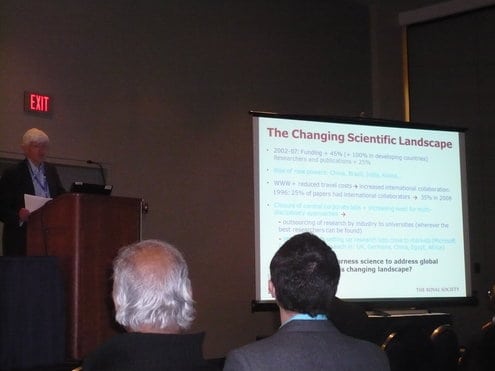
Chris Llewellyn Smith speaking to delegates
By Michael Banks in Washington, DC
The 2011 American Association for the Advancement of Science meeting in Washington, DC had a slight winding-down feel to it today as the placards were being removed and the exhibitors packed their stalls.
But there was still a morning of talks to be had. So I headed to a session entitled “Can global science solve global challenges?” where Chris Llewellyn Smith spoke about past and future global science projects. He is an ideal speaker for the topic, given that he has been director-general of the CERN particle-physics lab and also served as chairman of the ITER council – the experimental fusion facility currently being constructed in Cadarache, France.
Llewellyn Smith went through some of the successes of global collaboration and consensus such as the eradication of smallpox in 1979 and the banning of CFCs in 1987, which successfully reduced the ozone hole.
The particle physicist also named a few examples of global collaborations that he felt had failed. This included scientists who were warning that a tsunami could occur in the Indian Ocean. The tsunami happened in 2004 killing 230,000 people and Llewellyn Smith says that lives could have been saved if warnings from scientists around the world had been heeded. He also adds communicating climate change as a challenging area that was damaged by scientists “not keeping objectivity and turning to advocacy”;.
Llewellyn Smith now calls for a global endeavour to be set up for the application of carbon capture and storage (CCS) to coal power stations that would include working out if the technique is at all possible and, if so, then the best way to store carbon dioxide underground. “CCS is going to be crucial if we don’t stop burning coal,” he says.
Indeed, Llewellyn Smith is involved with a Royal Society report into global science, which will be released on 29 March. He didn’t want to give the report’s conclusions away but says the report will concern “where science is happening and who is working with who”. There will be no specific recommendations made in the report but “we hope that it will start a debate” he says.



